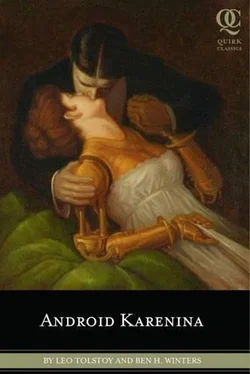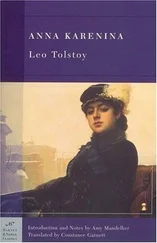It’s not the admiration of the crowd that has intoxicated her, Kitty thought, but the adoration of one. And that one? Can it be he? Every time he spoke to Anna the joyous light flashed into her eyes, and the smile of happiness curved her red lips. She seemed to make an effort to control herself, to try not to show these signs of delight, but they came out on her face of themselves. But what of him? Kitty looked at him and was filled with terror. What was pictured so clearly to Kitty in the mirror of Anna’s face, she saw in him as well. What had become of his always self-possessed, resolute manner, and the carelessly serene expression of his face? Now every time he turned to her, he bent his head, as though he would have fallen at her feet, and in his eyes there was nothing but humble submission and dread. I would not offend you, his eyes seemed every time to be saying, but I want to save myself, and I don’t know how. On his face was a look such as Kitty had never seen before.
“Kitty, what is it?” said Countess Nordston, setting down gracefully on the carpet beside her. “I don’t understand it.”
Kitty’s lower lip began to quiver; she got up quickly.
“Kitty, the chime has sounded. You’re not dancing the mazurka?”
“No, no,” said Kitty in a voice shaking with tears.
Countess Nordston found Korsunsky, with whom she was to dance the mazurka; he was sunk in a corner, insensible to the world around him, sobbing quietly and cradling the melted wreck of his beloved-companion’s head in his lap. The countess shook him vigorously and told him to get a hold of himself and go ask Kitty.
Kitty danced in the first couple, and luckily for her she had not to talk, because Korsunsky was all the time weeping for his dear Portcullis, and how “there must have been some mistake, there must have been.” Vronsky and Anna floated almost opposite her. She saw them with her long-sighted eyes, and saw them, too, close by, when they met in the figures, dipping and swooping, spinning and leaping over each other on those trickily swift triple-time mazurka air-blasts. The more she saw of them, the more convinced she was that her unhappiness was complete. She saw that they felt themselves alone in that crowded room. And on Vronsky’s face, always so firm and independent, she saw that look that had struck her, of bewilderment and humble submissiveness, like the expression of an intelligent dog when it has done wrong.
Anna smiled, and her smile was reflected by him. She grew thoughtful, and he became serious. Some supernatural force drew Kitty’s eyes to Anna’s face. She was fascinating against the deep black midnight shadows cast by Android Karenina; fascinating were her round arms with their bracelets, fascinating was her firm neck with its thread of pearls, fascinating the straying curls of her loose hair, gaily swaying in the airstreams, fascinating the graceful, light movements of her little feet and hands, fascinating was that lovely face in its eagerness, but there was something terrible and cruel in her fascination.
Kitty admired her more than ever, and more and more acute was her suffering. Kitty felt overwhelmed, and her face showed it. When Vronsky saw her, sailing by in the mazurka, he did not at once recognize her, she was so changed.
“Delightful float!” he said to her, for the sake of saying something.
“Yes,” she answered.
The float concluded with the presentation of Kitty’s Class III, a tall, graceful android constructed with the lithe form and pink coloring of a ballet dancer, just as Kitty in her childish fancy had long desired. The companion robot was named Tatiana, and the beauty of her face and figure were applauded by the crowd. But Kitty could barely muster an appreciative smile, and shortly thereafter she hurriedly left the dance, her new Class III fluttering along behind her, her tutu flapping as they fled.
YES, THERE IS SOMETHING in me hateful, repulsive,” said Levin bitterly to Socrates, who nodded his yellow metal head slowly, reluctantly. Together they came away from the Shcherbatskys’ and walked in the direction of his brother Nikolai’s lodgings. “And I don’t get on with other people. Pride, they say. No, I have no pride. If I had any pride, I should not have put myself in such a position.” And he pictured to himself Vronsky, happy, good-natured, clever, that handsome wolf of a Class III bounding along at his feet, so self-possessed, and felt sure he had never been placed in the awful position in which he had been that evening.
“Yes, she was bound to choose him.”
“It had to be,” agreed Socrates sadly. “You cannot complain of anyone or anything.”
“I am myself to blame. What right had I to imagine she would care to join her life to mine?”
“Who are you? What are you?”
“A nobody, not wanted by anyone, nor of use to anybody.”
Man and machine sighed heavily in melancholy unison.
To prepare Levin for what was to be a difficult visit to his brother, Socrates initiated his monitor and displayed for his master a sequence of Nikolai Memories: Nikolai tottering drunkenly, sneering, with his torn coat and his disdain for the world and all the people in it.
“Isn’t he right that everything in the world is base and loathsome?”
“No,” said Socrates, who felt at such times a programmatic responsibility to balance his master’s gloomy emotional state with a more sober analysis. “No, it cannot be.”
“And are we fair in our judgment of brother Nikolai? Of course, from the point of some, tipsy and wearing his torn cloak, accompanied by that battered, old, oil-stained Class III, he’s a despicable person. But I know him differently. I know his soul, and know that we are like him. And I, instead of going to seek him out, went out to dinner, and came here.” Levin sighed again, had Socrates call Nikolai’s address up from his internal archives, and called a sledge. All the long way to his brother’s, Levin continued to view all the vivid Memories familiar to him of his brother Nikolai’s life.
He watched how his brother, while at the university, and for a year afterward, had, in spite of the jeers of his companions, lived like a monk, strictly observing all religious rites, services, and fasts, and avoiding every sort of pleasure, especially women. And afterward, how he had all at once broken out: he had associated with the most horrible people, and rushed into the most senseless debauchery-including, it had been whispered, relationships of an intimate nature with robots, relationships that were forbidden in even the most liberal construction of the Ministry’s laws, and of God’s.
It was all horribly disgusting, yet to Levin it appeared not at all in the same disgusting light as it inevitably would to those who did not know Nikolai, did not know all his story, did not know his heart.
Levin felt that, in spite of all the ugliness of his life, his brother Nikolai, in his soul, in the very depths of his soul, was no more in the wrong than the people who despised him. He was not to blame for having been born with his unbridled temperament and his somehow limited intelligence. But he had always wanted to be good. And now, or so he had written, he had fallen ill-terribly ill, if Levin could judge by his brother’s latest letter, though the precise nature of his illness remained unclear.
I will tell him everything, without reserve, and I will make him speak without reserve, too, and I’ll show him that I love him, and so understand him, Levin resolved to himself, as, toward eleven o’clock, he reached the hotel of which he had the address.
“The top… twelve and thirteen,” the II/Porter7e62 answered automatically to Levin’s inquiries.
Читать дальше












